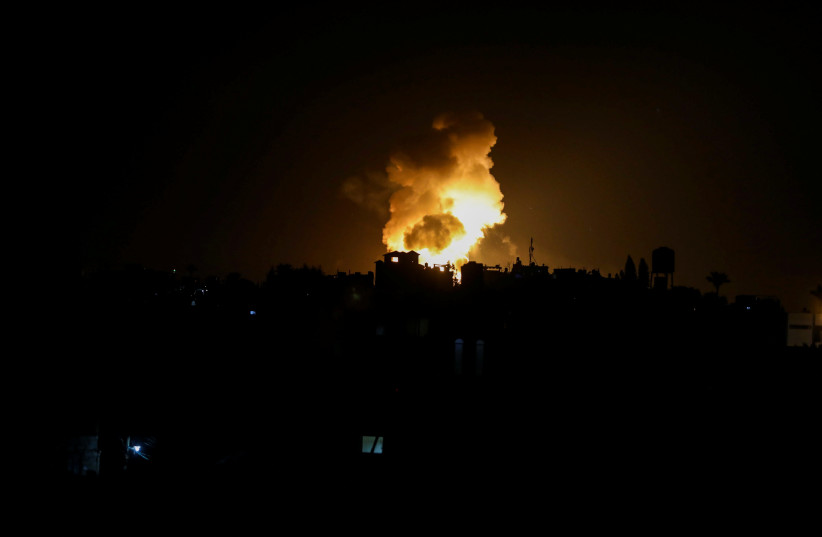Operation Shield and Arrow, a five-day military campaign targeting the Palestinian Islamic Jihad, falls short of Prime Minister Benjamin Netanyahu’s claims of establishing a new equation against both the Islamic Jihad and Hamas in the Gaza Strip. It is evident that the current approach is ineffective and Jerusalem must acknowledge the need for a different stance going forward.
Terrorist organizations in the Gaza Strip have proven their ability to adapt to Israel’s actions, including repeated military operations that follow a similar pattern of deterrence. To significantly reduce terrorism from the Gaza Strip, Israel must shift its strategy from deterrence to decisiveness.
Similar to previous operations, such as Black Belt in 2019 and Breaking Dawn in 2021, the commencement of Operation Shield and Arrow began with a surprise deception, offensive initiative, creative tactics and precise execution aimed at thwarting senior officials of the Islamic Jihad.
The Israeli Defense Forces showcased its high-level intelligence capabilities and improved their effectiveness in neutralizing rocket-launching squads by executing well-coordinated “closure of cycles” (the time between locating the target and destroying it).
Despite some unavoidable harm to non-combatants due to the cynical and cruel tactics of terrorist organizations operating in civilian areas, the operation concluded without significant international criticism, a United Nations Security Council resolution against it, or substantial pressure from the Biden administration. This represents a notable political and diplomatic achievement for Israel.
However, Israel failed to present a new approach in both military and political strategies beyond the initial phase of the operation. Despite the successful elimination of senior officials of the Islamic Jihad (a tactic of significant importance), it should be noted that such actions have become routine in recent military operations, including the aforementioned Black Belt and Breaking Dawn operations against the Islamic Jihad. On top of that, targeting senior members of a terrorist organization – an important tool in itself – is not enough on its own.
These are routine actions in military operations, certainly in the last two operations against the Islamic Jihad (Black Belt and Breaking Dawn). Israel was only able to neutralize approximately 23 terrorist operatives, including the top six, from a terrorist organization comprising tens of thousands of members. Moreover, the majority of the Islamic Jihad’s extensive rocket depots, numbering in the thousands, remained intact.
THROUGHOUT THE operation, the IDF primarily focused on targeting launch sites, launch squads and the destruction of terrorist operatives’ homes, which is a crucial step but not sufficient on its own. All of this was carried out while maintaining a relatively low rate of fire and a desire to reach a ceasefire at an early stage of the operation. In essence, the IDF aimed to pass the time until a ceasefire could be achieved.
Israel’s claims of successfully keeping Hamas out of the military operation appear to be exaggerated. While it is true that Israel sought to create a division between the two terrorist organizations in order to undermine the stability in the Gaza Strip and adopt a divide-and-rule strategy, there was also an operational necessity to focus on the relatively weaker threat posed by the Islamic Jihad.
However, Israel failed to capitalize on the fact that Hamas did not intervene in the operation, missing an opportunity to deal a severe blow to the Islamic Jihad, which possesses numerous infrastructures, assets and operatives.
To effectively neutralize a sizable and formidable terrorist organization, like the Islamic Jihad, Israel would have had to order the IDF to employ much greater force.
This could have involved demolishing high-rise towers associated with the organization, eliminating hundreds of its operatives, swiftly destroying dozens of operatives’ homes (in a single day rather than five), and employing a high rate of fire and intense bombardment. The aim would have been to accumulate significant operational achievements within a short span of time.
In practice, however, the IDF, once again, followed a predictable military operation template, with a slow-paced approach moderately targeting objectives and exhibiting a low-to-medium intensity level of fire.
Furthermore, Israel allowed the Islamic Jihad to violate the ceasefire just two hours after the agreed-upon time. While the IDF did respond with an attack on three Islamic Jihad positions following the rocket launches, these targets were considered of minimal strategic value.
Ultimately, instead of capitalizing on the available time and significant operational advantage (given Hamas’s non-intervention), Israel missed an opportunity to achieve even a minor strategic victory through a decisive blow against the Islamic Jihad.
Distinguishing between deterrence and decisive operations
The Shield and Arrow operation targeting the Islamic Jihad was initially designed with a modest goal in mind – deterrence against the second most powerful terrorist organization in the Gaza Strip.
This operation joins a series of deterrence operations aimed at achieving medium to long-term quiet. In practice, these operations, due to their limited military power, managed to reinforce deterrence against terrorist organizations for a few months (in the case of the Islamic Jihad) or up to a few years at most (in the case of Hamas).
Deterrence operations stand in contrast to decisive operations (or wars) that aim for physical destruction of the enemy. Israeli governments, particularly under the leadership of Benjamin Netanyahu over the past two decades, have consistently chosen to adhere to a strategy of deterrence in the Gaza Strip, at the expense of a strategy of decisiveness.
This preference is driven, in part, by the cost associated with a decisive war. This cost includes a high number of soldier casualties, significant and long-lasting economic and societal disruptions within the country, limited international support for a large-scale war resulting in substantial casualties and widespread destruction (including civilian infrastructure), and more.
As a result of prioritizing deterrence over decisiveness, Israel experiences brief military engagements every few months, with more extensive military operations occurring once every two to three years.
It is important to note that during periods of ceasefire, terrorist organizations refine their military capabilities and strengthen their resources, combat forces, command and control systems, and defensive measures. While Israel also develops its offensive and defensive capabilities during these periods, from Israel’s perspective, it is preferable to avoid confronting an organized military force on the scale of Hezbollah in the future.
To prevent a situation akin to “Hezbollah 2” in the south, which is currently progressing in that direction, Israel would be wise to transition from a strategy of deterrence to one of decisiveness. History has shown that terrorism can only be effectively defeated through determined warfare.
The writer has a Ph.D. in political studies. He is a military strategy and national security expert, and a researcher at the Jerusalem Institute for Strategy and Security (JISS) and at the Israel Defense and Security Forum (Habithonistim).

